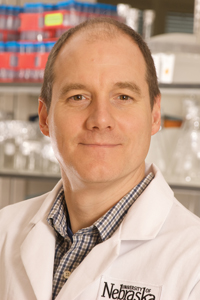 |
Ken Bayles, Ph.D. |
NOTE: This profile is part of a series highlighting the 23 researchers who were named UNMC Distinguished Scientists or New Investigators for 2008. Each of these researchers will be profiled in UNMC Today leading up to a March 16 ceremony to recognize their achievements.
- Name: Ken Bayles, Ph.D.
- Title: Professor of pathology and microbiology
- Joined UNMC: 2005
- Hometown: Hutchinson, Kan.
Describe your research in laymen terms.
My research focuses on understanding the molecular elements controlling cell death in bacteria and the evolutionary relationship between this process and similar processes in animal cells.
What led you to pursue this area of research?
As a post-doctoral fellow in the early 1990s, I discovered a new family of bacterial proteins that affected how antibiotics kill bacteria. Continued investigations of these proteins over the years helped shape our understanding of them and led to the current idea that regulated cell death is important during the normal bacterial life cycle.
How do you see your research contributing to science?
Textbooks are filled with information about how bacterial cells grow and divide, but contain virtually nothing about how they die. Our hope is that we are filling this void.
Why did you become a scientist?
When I was a little boy, I was glued to the TV set when “The Undersea Adventures of Jacques Cousteau” came on. I was fascinated by the animals and the ocean. Since I grew up in Kansas, far from any ocean, I adjusted my dream a bit and became a microbiologist.
What is your hope for the next generation of scientists?
I hope they will get the support to pursue whatever hypothesis they are interested in, no matter how far-fetched it may seem. These are where the great discoveries are made.
Beyond grant funding, how do you measure success?
I think one of the most important measures of success is related to the level of interest people have in hearing what you have to say. This often takes the form of invitations to write review articles or to present ones research at conferences and university seminars.
What would you tell a student interested in a research career?
Don’t let horror stories about funding discourage you from pursuing your dream. Funding opportunities experience peaks and valleys and there will be ample opportunities for basic science research in the future.
Do you have a hero/role model? If so, what do you admire most about this person?
No one in particular. The only role models I have are people who have experienced great success but who still have their feet firmly planted on the ground.
Tell us about your family and hobbies outside of the lab.
I’ve been married to Helen North for 13 years and have two great kids, Alexander, 10, and Laina, 7. Helen’s father (Robert North) is a well-known TB researcher, which is probably why she can handle me when it’s time to write grant proposals. My hobbies include exercising, golfing (poorly) and traveling.
List three things few people know about you.
- In graduate school, I performed experiments in zero gravity on NASA’s “vomit comet” and was so excited about this experience that I applied to be an astronaut. Fortunately, I was promptly rejected.
- I’ve flown on the Goodyear blimp twice.
- I used to have hair.
Click here to see the UNMC Honors Web site, which features photos of profiles of the medical center’s Distinguished Scientists and New Investigators.